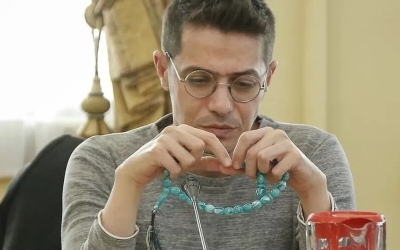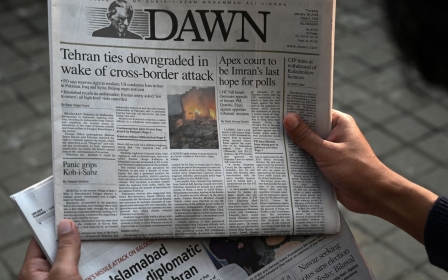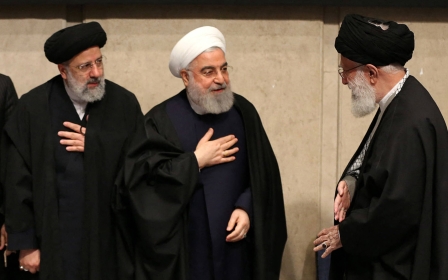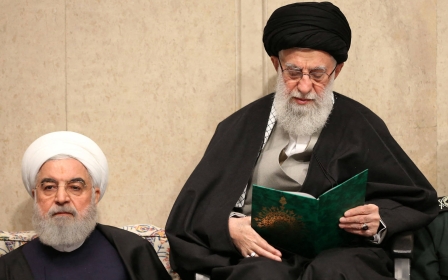Raisi wins expert assembly election as rivals removed from ballot: Iranian press review
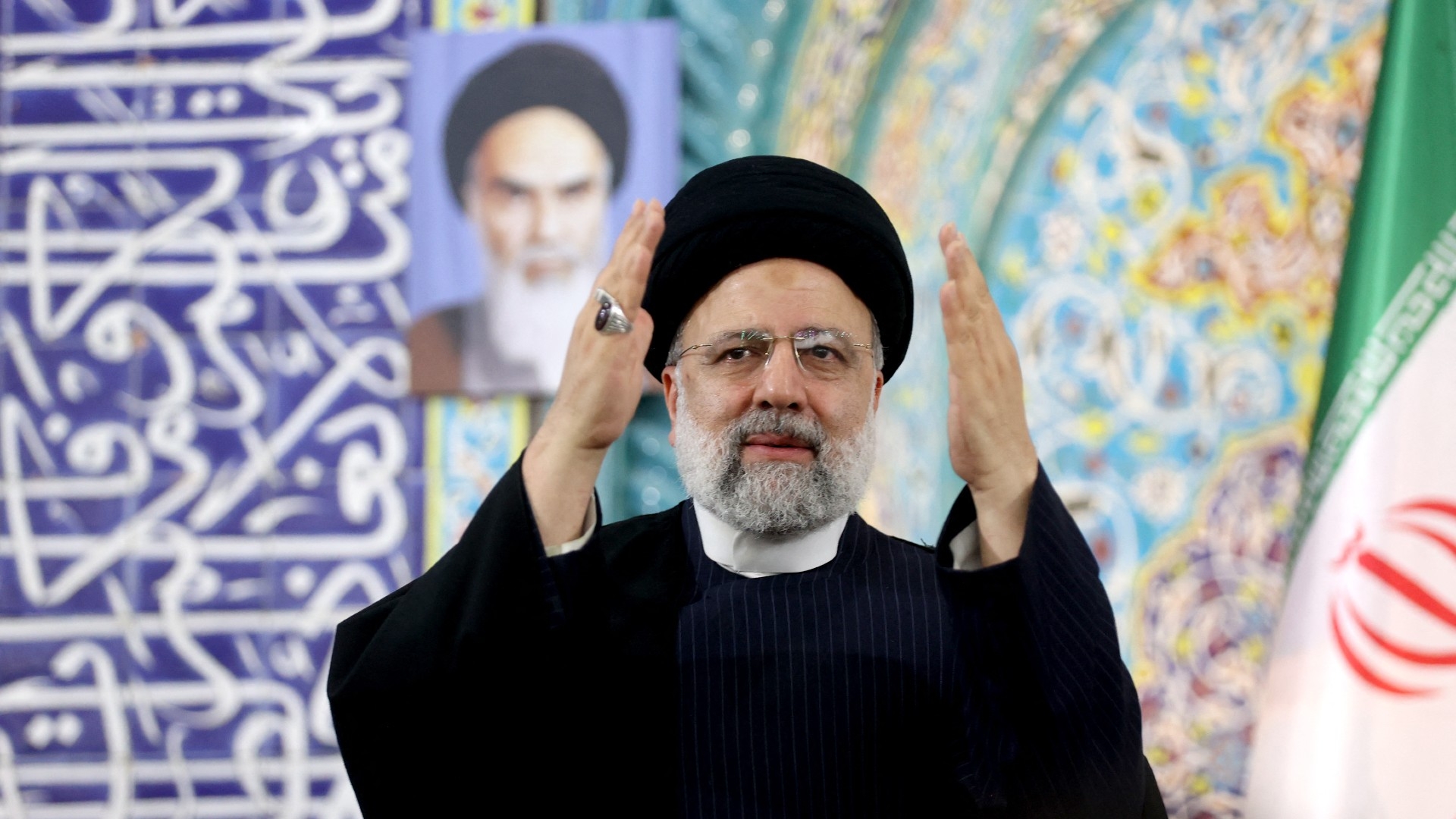
Raisi wins expert assembly election before polls open
The removal of candidates challenging Iranian President Ebrahim Raisi in an upcoming election for the Assembly of Experts has sparked widespread criticism.
The assembly, referred to locally as Majles Khobregan, is composed of 88 qualified Islamic jurists and clerics who, based on the constitution, are responsible for appointing, supervising, and dismissing the supreme leader.
The Guardian Council, which is tasked with vetting the candidates, has disqualified a large number of hopefuls for the election, due to take place on 1 March.
Former President Hassan Rouhani is among several moderate candidates disqualified. Mostafa Pourmohammadi, a conservative figure who has shifted to a more moderate stance, was also reportedly removed.
All four contenders seeking to challenge Raisi in the South Khorasan province also did not make it on to the ballot, the council announced last month. As a result, Raisi automatically secured a position on the assembly.
The Arman Melli daily, under the headline "Khobregan's competition in South Khorasan just got complicated", wrote: "It is intriguing that there is no competition in the province, particularly when the sole candidate, Ebrahim Raisi, is already the president."
Discontent over the election was not limited to just pro-reformist newspapers and politicians - it even reached those aligned with the current leadership.
Abdulreza Davari, a former advisor to President Mahmoud Ahmadinejad, voiced his concerns on social media, stating: "They expelled all four of Raisi's rivals in South Khorasan, revealing the representative for the region 35 days before the elections: Ebrahim Raisi! The Guardian Council claims they merely guide elections; they dictate the course."
One social media user drew a sports analogy, joking that Raisi had been drawn into "the group of death" - in which all the candidates were him.
Tehran blames 'foreign enemies' for sharp currency decline
Iranian officials and lawmakers have claimed that this week's steep depreciation of the national currency was due to "foreign enemies," rejecting any claims about the country's economic crisis and the government's mismanagement.
As tensions continue to mount between Iranian-backed groups in Yemen, Syria and Iraq and the US, UK and its allies in the region, the Iranian rial has sharply declined against the US dollar.
'The heads of some countries told the president that Americans have announced that their target is Iran's economy'
- Sepehr Khalaji, government information council
On 7 January, one US dollar was sold for about 500,000 rials on the open market, but as of last week that stood at about 600,000 rials. The rate is far below the artificially maintained official rate of around 42,000 to the dollar.
It follows a similar pattern of rial depreciation over the past four decades whenever there has been a risk of war or military confrontation involving Iran.
Sepehr Khalaji, the chief of the government's information council, suggested that the country's western enemies were behind the destabilisation of the economy.
"The enemy has designed a space to create shocks in the economy and put pressure on the people. The heads of some [friendly] countries told the president that Americans have announced that their target is Iran's economy," Jamaran News quoted Khalaji as saying.
Hossein Shariatmadari, an ultra-conservative politician, echoed the same claims, and suggested that websites and social media platforms announcing changes in the currency market were responsible for causing fluctuations.
Political prisoners plead for UN official meeting
Iranian political prisoners and rights activists called on the UN deputy high commissioner for human rights, Nada al-Nashif, to meet inmates on death row during a visit to Iran.
On Saturday, Nashif landed in Tehran for a three-day visit to talk with Iranian officials and investigate executions and alleged violations of rights, particularly since protests broke out in 2022 over the death of 22-year-old Mahsa Amini.
Political prisoners raised concerned that such a visit during a period of increased executions would embolden Iranian authorities to intensify their use of the death penalty.
On Friday, a group of political prisoners at Ghezel Hesar Prison, in an open letter to Al-Nashif, urged her to meet with the prisoners directly instead of holding meetings with the officials.
“Ghezel Hesar Prison is the main detention centre for prisoners under a death sentence in Tehran … we invite you to come to this prison and listen closely to our and other prisoners' observations of the violations of the rights and the stories of executed prisoners in recent months and years,” the letter stated.
The same prisoners had earlier announced that they would go on a hunger strike every Tuesday in protest against the rising number of executions.
Four men, Mohsen Mazloum, Pejman Fatehi, Vafa Azarbar and Hajir Faramarzi, were executed last week in Ghezel Hesar Prison despite a campaign to halt their sentences. Iran accused the men of alleged sabotage and links with Israeli intelligence, according to state media.
Last week, the Norway-based Iran Human Rights organisation urged the international community to “end their silence” on a new wave of executions.
“The organisation also urges Nada al-Nashif, the UN Deputy High Commissioner for Human Rights, to cancel her upcoming visit to Iran and explicitly state that the reason is to protest these executions,” the group said in a report.
* Iranian press review is a digest of news reports not independently verified by Middle East Eye
Middle East Eye propose une couverture et une analyse indépendantes et incomparables du Moyen-Orient, de l’Afrique du Nord et d’autres régions du monde. Pour en savoir plus sur la reprise de ce contenu et les frais qui s’appliquent, veuillez remplir ce formulaire [en anglais]. Pour en savoir plus sur MEE, cliquez ici [en anglais].


